|
|
|
Sort Order |
|
|
|
Items / Page
|
|
|
|
|
|
|
| Srl | Item |
| 1 |
ID:
131291
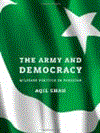

|
|
|
|
|
| Publication |
Cambridge, Harvard University Press, 2014.
|
| Description |
xiii, 399p.Hbk
|
| Standard Number |
9780674728936
|
|
|
|
|
|
|
|
|
|
|
|
Copies: C:1/I:0,R:0,Q:0
Circulation
| Accession# | Call# | Current Location | Status | Policy | Location |
| 057784 | 322.5095491/SHA 057784 | Main | On Shelf | General | |
|
|
|
|
| 2 |
ID:
131272
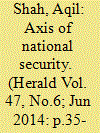

|
|
|
| 3 |
ID:
144387
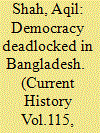

|
|
|
|
|
| Summary/Abstract |
The prospects for successful democratic consolidation in Bangladesh will depend on the political elites’ ability to abandon their zero-sum rivalry and demonstrate commitment to democratic norms in their attitudes and behavior.”
|
|
|
|
|
|
|
|
|
|
|
|
|
|
|
|
| 4 |
ID:
159473
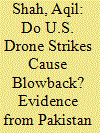

|
|
|
|
|
| Summary/Abstract |
Many analysts argue that U.S. drone strikes generate blowback: by killing innocent civilians, such strikes radicalize Muslim populations at the local, national, and even transnational levels. This claim, however, is based primarily on anecdotal evidence, unreliable media reports, and advocacy-driven research by human rights groups. Interview and survey data from Pakistan, where, since 2004, the U.S. Central Intelligence Agency has launched more than 430 drone strikes, show little or no evidence that drone strikes have a significant impact on militant Islamist recruitment either locally or nationally. Rather, the data reveal the importance of factors such as political and economic grievances, the Pakistani state's selective counterterrorism policies, its indiscriminate repression of the local population, and forced recruitment of youth by militant groups. Similarly, trial testimony and accounts of terrorists convicted in the United States, as well as the social science scholarship on Muslim radicalization in the United States and Europe, provide scant evidence that drone strikes are the main cause of militant Islamism. Instead, factors that matter include a transnational Islamic identity's appeal to young immigrants with conflicted identities, state immigration and integration policies that marginalize Muslim communities, the influence of peers and social networks, and online exposure to violent jihadist ideologies within the overall context of U.S. military interventions in Muslim countries.
|
|
|
|
|
|
|
|
|
|
|
|
|
|
|
|
| 5 |
ID:
103409
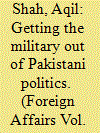

|
|
|
| 6 |
ID:
145455
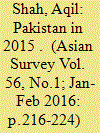

|
|
|
|
|
| Summary/Abstract |
Pakistan’s government adopted an ambitious National Action Plan to counter terrorism. Aside from poor implementation, the plan remains bedeviled by the powerful military’s selective counterterrorism approach, which targets hostile militant groups, like the Pakistani Taliban, but employs others, including the Afghan Taliban, to assert its own influence over Kabul and limit what it sees as Indian interference in Afghanistan.
|
|
|
|
|
|
|
|
|
|
|
|
|
|
|
|
|
|
|
|
|